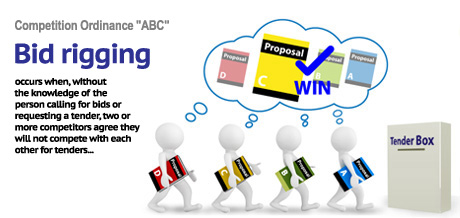
Bid-rigging occurs when, without the knowledge of the person calling for bids or requesting a tender, two or more competitors agree they will not compete with each other for tenders, allowing one of the cartel members to “win” the tender.
The most common form of bid-rigging is when competitors agree on who should win a tender. To support the designated winner, the other bidders may agree to refrain from bidding, withdraw their bid, or submit bids with higher prices or on unacceptable terms.
An essential feature of a healthy competitive tender system is that suppliers prepare and submit bids independently. Bid rigging results in higher prices and potentially lower quality goods and services. Under the Competition Ordinance, it is a serious anti-competitive conduct.
The Competition Commission has developed
a series of educational materials
to raise community awareness of bid-rigging and to educate on how to prevent and detect bid-rigging.